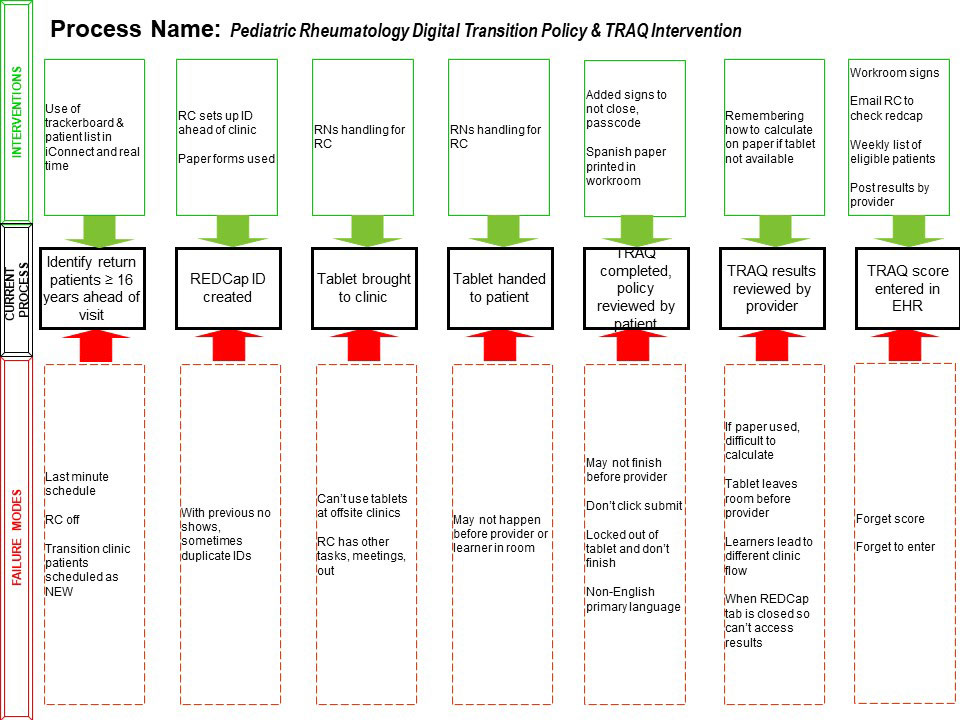Session Information
Session Type: Poster Session C
Session Time: 1:00PM-3:00PM
Background/Purpose: The process of transition from pediatric- to adult-based care should be well-timed, coordinated, and planned to educate and encourage the adolescent towards an adult role and healthcare independence. While national practice guidelines for structured transition processes are published, significant variation exists in how these guidelines are implemented into routine practice. Our objective was to use a digital intervention to improve transition policy distribution and collection of the Transition Readiness Assessment Questionnaire (TRAQ).
Methods: The intervention took place from August 2021 through April 2022 at a tertiary care pediatric rheumatology clinic. Eligible visits for patients at least 16 years-old with at least one prior ambulatory pediatric rheumatology visit were identified using the electronic health record (EHR). Improvement science methodology was applied including process maps, key driver diagrams, and failure modes effect analysis (FMEA) (Figure 1). Baseline performance was calculated. Using Plan-Do-Study-Act cycles, we implemented a process using tablets during the clinic visit to distribute the transition policy and collect the TRAQ digitally via REDCap software. Primary outcome measures included percentage of eligible patients each week who acknowledged policy distribution, who completed the TRAQ digitally, and with recorded TRAQ score in the EHR as a proxy for discussion with care team. Performance on these measures was monitored over time using run chart software.
Results: Prior to the intervention, our clinic had a written transition policy, but no system to monitor distribution to patients. We also collected the TRAQ manually with results scanned as a document into the EHR after the clinic visit. This process made it difficult to quickly calculate a score and monitor completion and change in scores over time. Our intervention began by benchmarking 2 months of baseline data. In October 2021, we received tablet equipment and began testing our digital transition policy distribution and TRAQ collection process in a limited number of clinics. In December 2021, we spread the process to all non-satellite pediatric rheumatology clinics at our center. A total of 475 visits were evaluated during the baseline and intervention periods. We improved our performance on transition policy distribution from 0% to 84% of eligible visits (Figure 2). We improved our performance on TRAQ score completion from 17% to 84% of eligible visits. We improved our performance on TRAQ score entered in the EHR from 17% to 50% of eligible visits (Figure 3).
Conclusion: By implementing a digital intervention, we improved reliable performance of recommended structured health care transition processes, including transition policy distribution and TRAQ completion, for adolescent age pediatric rheumatology patients. We are currently pursuing additional interventions to improve reliability of entering the digitally collected TRAQ score into the EHR. By concurrently implementing a structured pediatric to adult health care transfer program, we will be able to evaluate pre-transfer TRAQ scores with transfer outcomes in the future.
To cite this abstract in AMA style:
Smitherman E, Huie L, Bridges J, Cron R, Gennaro V, Jerkins K, Mauldin J, McAllister L, Reed A, Reiff D, Reynolds E, Sanchez I, Smith C, Stoll M, Webb T, Weiser P, Zech J, Mannion M. Reliable Transition Policy Distribution and Transition Readiness Assessment Questionnaire Completion Using a Digital Intervention in a Pediatric Rheumatology Clinic [abstract]. Arthritis Rheumatol. 2022; 74 (suppl 9). https://acrabstracts.org/abstract/reliable-transition-policy-distribution-and-transition-readiness-assessment-questionnaire-completion-using-a-digital-intervention-in-a-pediatric-rheumatology-clinic/. Accessed .« Back to ACR Convergence 2022
ACR Meeting Abstracts - https://acrabstracts.org/abstract/reliable-transition-policy-distribution-and-transition-readiness-assessment-questionnaire-completion-using-a-digital-intervention-in-a-pediatric-rheumatology-clinic/



